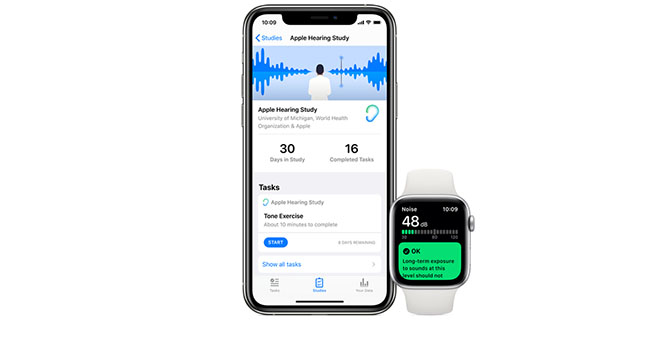Michigan Public Health Working with Apple on Study on Sound Exposure in Daily Life

New Study from Rick Neitzel
Associate Professor of Environmental Health Sciences
Noise exposure has often been associated with occupational activities that lead to hearing loss: the banging noises at construction sites, airplanes lifting off at airports, loud machines in factories. But now we're learning that recreational activities, like going to concerts and noisy hobbies, can also lead to hearing loss.
Until recently, measuring noise exposure has been cumbersome, and impact of personal exposures to music on hearing health, for example, have been largely ignored in research studies, says University of Michigan School of Public Health researcher Rick Neitzel, who recently partnered with Apple to develop a study that will use a person's iPhone and Apple Watch to measure levels of sound exposure.
"Historically, we've had to put noise measurement devices on people," said Neitzel, an associate professor of environmental health sciences at the University of Michigan School of Public Health . "We would have them wear a noise dosimeter for somewhere between a day and a week, and the dosimeter would tell us all how much environmental sound exposure they got from their surroundings. It was a hassle because people had to wear something extra, they only wore the dosimeter for a short period, and the measurement didn't include exposure that they got through their headphones.
"For the very first time, at an individual level, we'll have a holistic sense of people's noise exposures. We'll start to be able to evaluate the link between music and hearing loss, and how long-term sound exposure can impact stress levels and cardiovascular health. We know that noisy work, for example, is directly linked to hearing loss, but we don't know much about music or other noisy hobbies."
Apple has announced the launch of the Apple Research app, which users can download to enroll and participate in the Apple Hearing Study conducted in partnership with the University of Michigan, and other health research studies such as the Apple Women's Health Study and the Heart and Movement study.
"The big step forward here is now we're not having someone wear something extra to get a measurement over a short period of time," Neitzel said. "We'll have much longer measures of exposure through a device many people are already using—their iPhone.
"And if the participants have an Apple Watch in addition to their iPhone we can get a cumulative measure of exposure—all the environmental sound, plus their music. That's never been done before and is a game-changer from a scientific perspective."
In order to participate in the study, any headphones can be used to measure the participant's headphone sound-exposure levels. Participants will also complete a pure-tone hearing test task and a speech listening test within the Apple Research app. The tone hearing tests will require the use of Apple AirPods or EarPods, which are included with iPhones. An Apple Watch is not required to participate in the study.
Once captured, and under Neitzel's direction, researchers in the Department of Environmental Health Sciences at the University of Michigan School of Public Health will analyze the study data to understand how sound levels may impact hearing health, stress levels and cardiovascular health.
Data from the study will also be shared with the World Health Organization's "Make Listening Safe" Initiative with the aim of informing new policies around hearing health to reduce hearing loss.
"A lot of Americans think of noise as maybe an occupational hazard. And as an industrial hygienist, that's been my focus historically," Neitzel said. "But what most of us fail to realize is that we can potentially get a lot of noise elsewhere in our lives.
"Think about going to concerts or shows or clubs, or the noisy restaurant where you have dinner. Any one of these activities alone might not be sufficient to harm your health, but if you're doing a lot of these activities everyday of your life eventually that may catch up with you and result in a hearing loss or something worse."
- To learn more or join the study, visit https://publichealth.umich.edu/applehearingstudy/
- Learn more about Michigan Public Health
